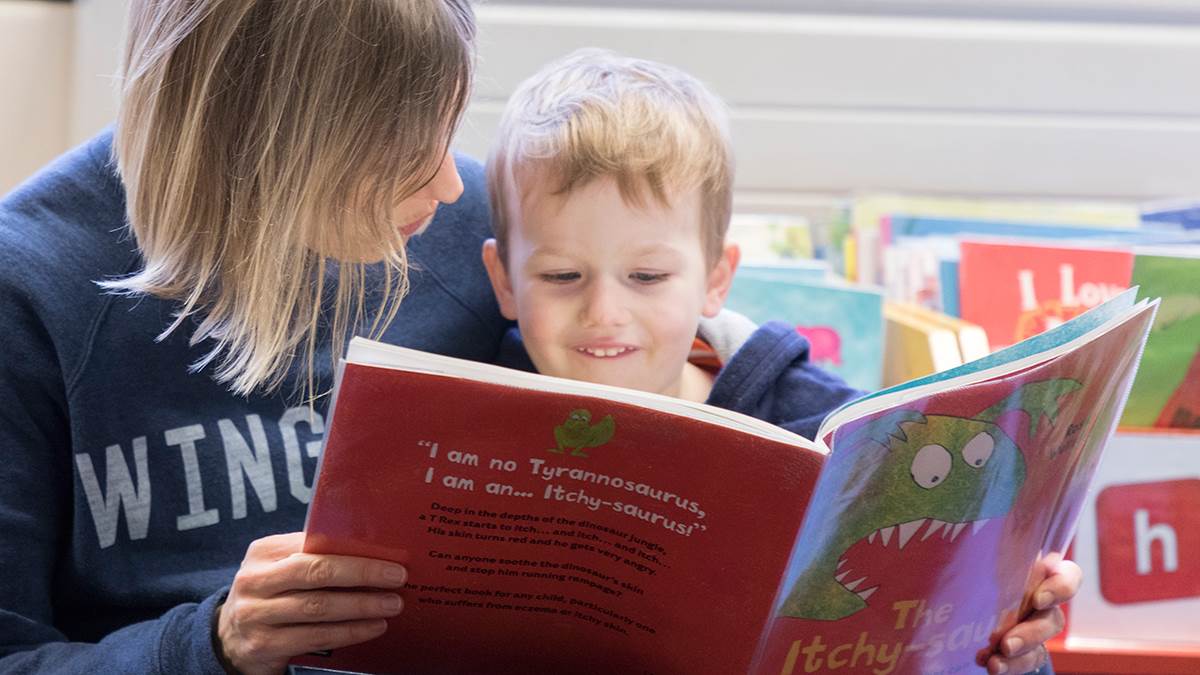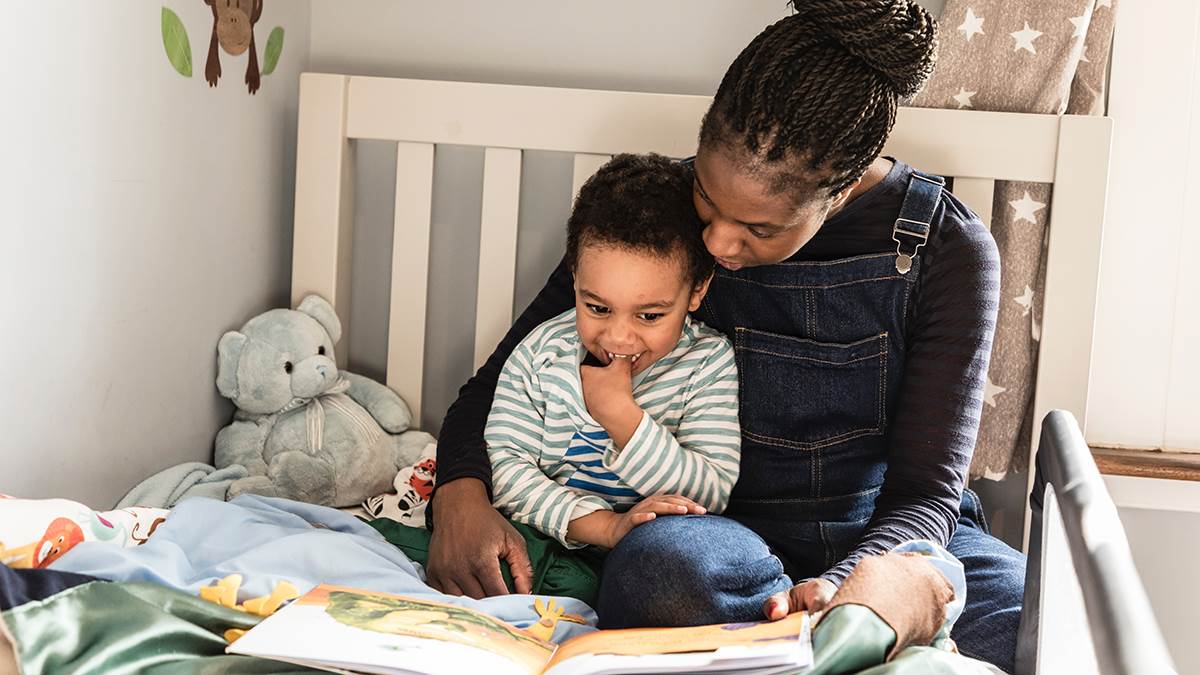Research and innovation
- The benefits of reading
- Children's reading habits in the early years
- The role of multiple ‘reading influencers’ in supporting children’s reading journeys
- Reading in the Early Years: Why starting shared reading early matters and role of Bookstart Baby
Stimulation from reading books, playing, talking, and singing with a parent or carer serves an important neurological function, enhancing cognitive, physical, social, and emotional growth.
Our Benefits of Reading report
Reading supports children to overcome disadvantage.
They will experience better educational mobility and social mobility.
- Reading for pleasure has the power to help mitigate socioeconomic inequalities such as low family income and educational background.
Those growing up in poverty are less likely to remain in poverty as adults.
- A child growing up in poverty who is read to at age five has a significantly higher chance of economic success in their 30s than their peers who are not read to.
Throughout school, they are more likely to overcome the barriers caused by disadvantage.
- Shared reading has a unique and transformative impact on school attainment. Shared reading at home exerts a stronger influence on children's academic performance than parents' supervision, control of homework or attendance of school activities.
- Disadvantaged children who achieve highly at the end of primary school are twice as likely to have been read to at home in their early years, compared to their peers.
- A child who is an engaged reader provides themselves with self-generated learning opportunities equivalent to several years of education.
- The impact of reading for pleasure is four times more powerful on progress in vocabulary, mathematics, and spelling at age 16, than that of parental education or parental socieoconomic status.
- Disadvantaged children aged 11-14 who read in their own time and take part in enriching activities at home are more likely to achieve three or more A-levels, compared to those not engaged in these activities.

Better mental wellbeing, social skills and strong relationships
They feel more secure and develop deep bonds with parents/carers.
- As a bonding activity, shared reading in their early years supports the development of a child's attachment (how safe, secure and trusting they feel around their parent or carer). Attachment is essential to a child’s future happiness, social competence, and ability to form meaningful connections. The availability of the ir parent or carer during shared reading contributes to a child’s sense of safety.
- Shared reading creates opportunities for joint attention and emotional closeness between a child and their parent or carer. Shared reading increases parental warmth and reduces parental stress , enabling them to provide the sensitive and nurturing interactions their children need to thrive.
- Children with secure attachments are more like ly to show enthusiasm an d attention during shared reading, which motivates their parent or carer to read with them more frequently and reinforces their opportunit ies to feel safe, secure and protected.
- It is the emotional aspects of shared reading ( e.g., cuddling, smiling, singing, and laughing) that boosts a child’s brain activities needed to forge secure attachment, not the parent or carer’s reading skill.
They have healthy routines and habits.
- Shared reading plays a role in promoting a relaxing and reassuring bedtime routine . Language-based bedtime routines such as reading are associated with better parental emotional availability and parental attention. Routines can support a safe, stable and predictable environment that's needed to facilitate children’s healthy development.
- Reading for pleasure also supports routines later in life. Children aged 11-14 who read for pleasure are more likely to adopt healthy behaviours.
They have better socio-emotional skills.
- Children who read more perform better in tasks of attention and have lower levels of hyperactivity.
- Reading is associated with improved interpersonal and social skills, helping children form meaningful relationships.
They have better mental wellbeing and self-esteem.
- By providing escapism and relaxation, reading can act as a protective factor against the adversity some children face.
- Children who regularly read for pleasure have better self-esteem and emotional regulation, with lower levels of emotional and behavioural challenges such as anxiety and aggression than those who don't.
- Children who read have higher levels of mental wellbeing and happiness.


Boy and mother reading together.
Speech and language milestones and doing better at school.
They have better brain development, attentional and cognitive ability.
- Children's brains experience the most growth in their first 5 years, when their brains are most responsive to their environment. Stimulation from reading books, playing, talking, and singing with a parent or carer serves an important neurological function, enhancing cognitive, physical, social, and emotional growth.
- Shared reading among children from low-income backgrounds enhances healthy brain activation in language, attention, memory, self-control, and adjustment.
- Reading for pleasure has long-lasting positive benefits on brain development. Younger children who read more score better on cognitive tests.
They have better school readiness and knowledge about the world.
- Children who start reading early and continue reading throughout childhood have greater general knowledge. Reading helps to kickstart and sustain a child's ongoing learning journey.
- Reading en hances educational attainment. By feeding into cognitive skill development, forms of reasoning, complex concepts and imaginative richness, reading supports children to develop problem solving and intellectual capacities .
They have better speech and language development and literacy skills.
- Shared reading provides unparalleled opportunities for a child’s verbal interactions with their parent or carer. Among the many key childhood activities such as playing with toys, arts and crafts or sharing mealtimes, shared reading has particular value in creating these opportunities.
- Shared reading offers children exposure to rich and novel vocabulary in meaningful contexts.
- Shared reading facilitates children’s word learning. Because the focus is entirely on the story, children do not have to extract new words from the stream of ongoing activities like they would in a free-play setting.
- There are several benefits of shared reading for a child's language and literacy outcomes in the early years, which support school readiness. These include vocabulary size, oral language skills, print awareness, word identification and comprehension skills.
- The impact of shared reading on literacy is unique. Among home learning activities such as parental help with reading and writing, playing music or learning the alphabet, only shared reading has a positive influence on literacy assessment at the end of Reception.
- The impact of shared reading on literacy is long lasting. Children who are read to frequently at age five are over half a school year ahead in reading performance at age 15, compared to those who are read to infrequently or not read to at all.
They make more progress across the curriculum.
- Reading for pleasure unlocks academic success across the curriculum. A child who is read to at age 1-2 scores higher in reading, spelling, grammar, and numeracy skills at age 8-11.
- Reading for pleasure at the ages of 10 and 16 has a substantial effect on a child’s cognitive scores in vocabulary, spelling, and mathematics at age 16.

Developing imagination, creativity and empathy.
They have more empathy.
- Empathy refers to the ability to value, feel, understand and respect other people’s experiences. Shared reading nurtures theory of mind abilities and empathic skills.
- Stories can offer children a realistic and authentic 'mirror' of their own lives and experiences and a 'window' to view the experiences of others. When children are emotionally involved in a story, they feel connected to and see their lives as part of the wider human experience. This can be transformative when it comes to developing their empathy.
- Children who read books that offer opportunities to empathise with the characters have increased levels of empathy, especially towards stigmatised groups.
They are more imaginative and creative.
- Engagement with stories nurtures the disposition a nd skillset that are fundamental to a child’s creativity throughout childhood. Stories with imaginative and magical elements enable children’s minds to transcend their immediate context, freeing them from a fixed way of thinking.
- By constantly formulating and reformulating their expectations of what might happen in a story, young readers practice mental flexibility, an openness to new situations and interpretations and problem-solving.
- A story can also prompt dramatisation , allowing children to use their imagination to visualise , verbalise or act it out.
- Children who are read to at age three make greater progress in creative development at the end of Reception than those who are not.


Share this page
More research
Our research and evaluation helps us to continually learn about how to inspire children to read for pleasure. Explore research and reports across early years, primary, secondary and wider reading for pleasure. Find out what impact our programmes have on children and families.
Follow us
Keep in touch
Sign up to our newsletters full of updates, activities, ways to support us and fun ideas to inspire children to read.
- Cookies
- Freedom of information
- Privacy policy
- Copyright notice
Charity number 313343
Copyright © 2024 BookTrust, No. 1 Aire Street, Leeds, LS1 4PR








